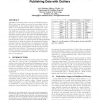Free Online Productivity Tools
i2Speak
i2Symbol
i2OCR
iTex2Img
iWeb2Print
iWeb2Shot
i2Type
iPdf2Split
iPdf2Merge
i2Bopomofo
i2Arabic
i2Style
i2Image
i2PDF
iLatex2Rtf
Sci2ools
94
Voted
EDBT
2009
ACM
2009
ACM
Hiding distinguished ones into crowd: privacy-preserving publishing data with outliers
Publishing microdata raises concerns of individual privacy. When there exist outlier records in the microdata, the distinguishability of the outliers enables their privacy to be easier to be compromised than that of regular ones. However, none of the existing anonymization techniques can provide sufficient protection to the privacy of the outliers. In this paper, we study the problem of anonymizing the microdata that contains outliers. We define the distinguishabilitybased attack by which the adversary can infer the existence of outliers as well as their private information from the anonymized microdata. To defend against the distinguishabilitybased attack, we define the plain k-anonymity as the privacy principle. Based on the definition, we categorize the outliers into two types, the ones that cannot be hidden by any plain k-anonymous group (called global outliers) and the ones that can (called local outliers). We propose the algorithm to efficiently anonymize local outliers with...
| Added | 24 Jul 2010 |
| Updated | 24 Jul 2010 |
| Type | Conference |
| Year | 2009 |
| Where | EDBT |
| Authors | Hui (Wendy) Wang, Ruilin Liu |
Comments (0)

